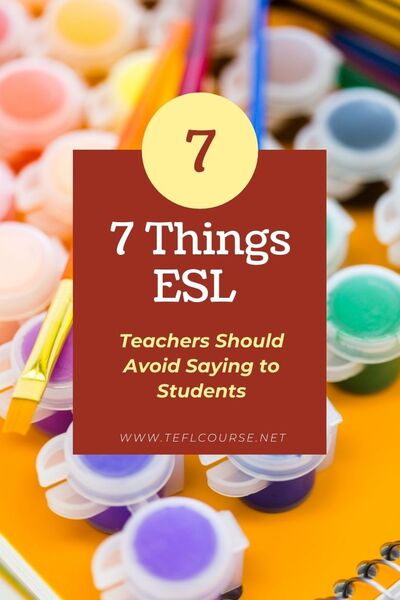7 Things ESL Teachers Should Avoid Saying to Students

ESL classroom is quite a sensitive place. Students can quickly get excited about what they learn if a teacher finds the right key to their motivation. However, sometimes ESL teachers may unconsciously use words that could hurt students intensely.
Table of Contents
1. You are not good at English.
2. Stop! You're doing it all wrong!
3. Good Job! You tried your best!
4. Don't give up! Keep trying and you'll understand English grammar.
5. Have you noticed your mistake?
6. It's ok if you can't do it.
7. Someone is better than you in English.
Do you want to teach English abroad? Take a TEFL course!
Check out what our course grads say in our many video testimonials!
Listen to this blog post:
Read on for the top 7 things that ESL teachers should avoid saying to students to make sure your students feel comfortable.
1. You are not good at English.
This phrase is very unpleasant to hear and irritates many students. Nobody wants to hear that they are bad at something when they spend a lot of time on it. Hearing such words from their teacher is even more frustrating.
Instead of demotivating your student with this phrase, try saying "If you keep learning consistently, you will master the four language skills and become proficient in English to communicate in different situations."
We all know there are different types of learners in every classroom, and it's essential to be patient with all of them. A teacher should never favor students over others.
Also Read: "7 Great Games for Your ESL Conversation Class"
2. Stop! You're doing it all wrong!
Such a reaction is common in ESL kindergartens. It's quite frustrating to explain the same thing many times and losing one's temper is easy. However, it can hurt a child so deep that they may even get real trauma and become unwilling to make attempts to continue their studies in the future.
The problem is that you can get involved in an unpleasant situation with the parents of your students and school management in such cases. Simply put, you'll look unprofessional and ruin your rapport with the student.

3. Good Job! You tried your best!
It may sound positive. However, this phrase means that you accept a less than optimal performance from your students.
Do not encourage your ESL/EFL students to stick to average. Always try to motivate them to strive for excellence by asking relevant questions.
For example, you can ask: "So, what can you do next to grow your understanding even further?"
Also Read: "Online Teaching and Interacting with Parents"
4. Don't give up! Keep trying and you'll understand English grammar.
You need to pay attention to the strategies your students use when doing different tasks. They may confirm that they understand everything during the lesson's study phase, but when it comes to practice, the students might put in a lot of effort into something that won't work because they misunderstood the rules.
If you say such a phrase of encouragement, it won't work either because the problem is actually in your explanation. Ensure your directions are clear, provide learners with as many examples as possible, and always ask for feedback.

5. Have you noticed your mistake?
This question isn't that bad in and of itself. However, it might confuse students and they might get upset. If your student made a mistake, don't correct them straight away, and at the same time, don't be too pushy when it comes to self-correction.
Try to guide them through their work, show correct examples, and help to find the problem naturally without even stating there is one. You'll get impressed by how students react when correcting their mistakes on their own.
Another idea would be to ask for a peer check. If you teach a group, encourage students to exchange their works and check their mate's work and vice versa.
Also Read: My Personal Experience Moving to Beijing to Teach English
6. It's ok if you can't do it.
Again, if you use such language in your classroom, it means you encourage a fixed mindset. You might be bothered and frustrated to explain one point many times, but that's how it works. Repetition in TEFL is an actual teaching approach.
Simultaneously, students also tend to say, "I just can't do it." Keep persistant and encourage them to train their language skill. If it doesn't work this time, get back to the same topic next lesson and be patient in explaining everything once again.
7. Someone is better than you in English.
Parents are often using this phrase. They tend to compare their child's results with other children. Unfortunately, teachers do it too!
When students hear that they do worse than someone else, their motivation worsens and they feel frustrated to continue their work. Never use such language with any age group to avoid this kind of situation.
Do you want to teach English abroad? Take a TEFL course!
To conclude, in the ESL classroom, there's no place for a fixed mindset. To help students grow as motivated and encouraged learners, you need to make sure your actions don't hurt anybody, and you use the correct language at every stage of your lesson.
Apply now & get certified to teach english abroad!
Speak with an ITTT advisor today to put together your personal plan for teaching English abroad.
Send us an email or call us toll-free at 1-800-490-0531 to speak with an ITTT advisor today.
Related Articles:
- Comparing English Language to Chinese Language
- 8 Things I Wish I had Known Before I Started Teaching English Online
- Why Teaching English in Chile is Awesome and Will Change Your Life
- Tips for EFL Teachers Coming to Teach English in Vietnam
- Top Tips For Dealing with the Recent Pandemic as a Foreign English Teacher in China
Check out what our course grads say in our many video testimonials!




